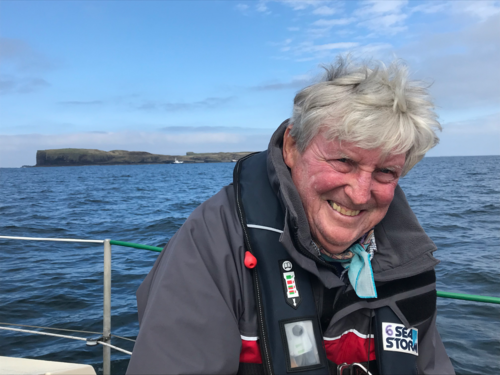Ian Dalziel is a Scottish geologist who pioneered the study of pre-Pangaea plate tectonics and the theory of supercontinent cycles on Earth.[1] In particular, he is known for geologic fieldwork in the southern Andes, the Scotia Arc, South Georgia and Antarctica.[2] His discoveries include evidence for the timing of the separation of South America from Antarctica and the beginning of the Antarctic Circumpolar Current.[3][4]
Ian W.D. Dalziel | |
|---|---|
Ian Dalziel at South Georgia Island in 2008. Photo courtesy Jackson School of Geosciences | |
| Born | 26 November 1937 Glasgow, Scotland |
| Nationality | Scottish |
| Alma mater | University of Edinburgh |
| Awards | Murchison Medal (1992) Bownocker Medal (1997) Clough Medal (2003) Honorary Fellow of the Geological Society (2005) Penrose Medal (2021) |
| Scientific career | |
| Fields | Geophysics field geology plate tectonics |
| Institutions | University of Texas Columbia University University of Wisconsin University of Edinburgh |
| Thesis | A Structural Study of the Granite Gneiss of Western Ardgour (1963) |
In 2021, Dalziel was awarded the Penrose Medal by the Geological Society of America.[5]
Biography
editEarly life
editIan Dalziel was born 26 November 1937, in Glasgow, Scotland where he lived with his actor parents before moving to the University of Edinburgh, where he earned a B.Sc. and later a Ph.D. in geology. As a child, Dalziel gained an early appreciation of geology and remote places while on holiday in the highlands and islands of Scotland with his actor parents.[1] [5]
Academic career
editAfter a short stint lecturing geology at University of Edinburgh, Dalziel moved to the U.S. to join the University of Wisconsin as assistant professor in 1963. Just a few years later, in 1967, he joined Columbia University as associate professor then later senior research scientist at Columbia University's Lamont-Doherty Geological Observatory (now the Lamont–Doherty Earth Observatory). In 1985, he made the move to Austin, Texas, to join the University of Texas at Austin Institute for Geophysics, where he is now research professor. [6]
Recognition
editIn 2021, Dalziel was awarded the Penrose Medal by the Geological Society of America for pioneering discoveries about Earth's ancient geography and its past supercontinents. The Penrose Medal is considered the highest honor to be awarded within the field of geology. At the award ceremony, Dalziel was recognized as "one of the great field-based geologists of our generation" and "one of the world’s leading geologists."[5][7]
References
edit- ^ a b "Top Geology Award Goes to Ian Dalziel of the University of Texas Institute for Geophysics". Ig.utexas.edu.
- ^ Beardmore, Josh (May 20, 2021). "Prof. Dalziel awarded prestigious GSA Penrose Medal". Supercontinent Cycles & Global Geodynamics.
- ^ "Ancient volcanic island arc blocked Antarctic current formation". Earthmagazine.org.
- ^ Dalziel, Ian W.D. (April 1, 2014). "Drake Passage and the Scotia arc: A tortuous space-time gateway for the Antarctic Circumpolar Current". Geology. 42 (4): 367–368. Bibcode:2014Geo....42..367D. doi:10.1130/focus042014.1 – via Silverchair.
- ^ a b c "Penrose Medal - 2021". Geosociety.org.
- ^ "IAN W. D. DALZIEL B.SC., PH.D., D.SC. (Hon), FRSE : Curriculum Vitae" (PDF). Ig.utexas.edu. Retrieved 19 July 2022.
- ^ "Ian W. D. Dalziel". Ig.utexas.edu.
